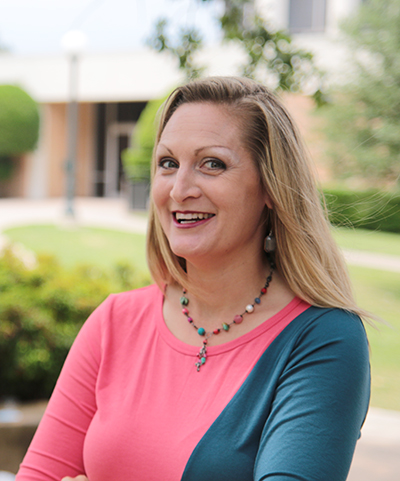 Mandy Stewart (Photo Credit: SriPadmini Chennapragada)
Mandy Stewart (Photo Credit: SriPadmini Chennapragada)One year ago, I joined a very “strange” group that meets in my local library. What makes us strange? Well, for starters we clap—a lot. Basically, anyone who says anything in the exceptionally structured meetings gets a hearty round of applause. We also shake hands euphorically in the midst of the applause and refer to those with particular roles as Mister or Madam.
But what really makes us different is that we view everyone who enters the room as a leader, a public speaker and a person with much to contribute. In our day-to-day lives, people can grow numb to negativity. We see those who lead, particularly public figures, picked apart and mocked for what they say, how they say it, even for their physical appearance. Perhaps this is what keeps most of us from stepping forward, speaking up, raising our hand or leaning in. Toastmasters, however, is a unique bubble in which people are actually rooting for one another and everyone is considered a leader. Everyone.
I began attending Toastmasters to improve my public speaking skills. As a college professor, I often hide behind my computer, letting my writing communicate what I have to say. I wanted to learn to communicate my ideas better—and I have done that. I have improved my speaking abilities at conferences, in the classes I teach or in front of any audience. The encouraging and constructive feedback I regularly receive from fellow members has helped me know what to focus on.
Yet the greatest benefit for me is in how I now view other people—particularly those whose lives I influence. Those are primarily my two children and my university students.
In our society we are conditioned to categorize people. We perceive some as “natural leaders” while believing others just don’t quite fit the bill. We may come to this conclusion because of an aspect of their personality, lack of previous experience, educational level, socio-economic status, physical appearance or the way they speak.
Even the quietest person in the room, the one sitting in the back, has much to contribute.
— MANDY STEWARTI was guilty of this. But this past year, I developed a different lens through which I view my students, whether they are pursuing a Ph.D. or a master’s or bachelor’s degree. I see them all as leaders and I provide them the same supportive environment Toastmasters provides me—a place to develop public speaking skills, to speak with confidence, persuade with authority and influence through words.
Even the quietest person in the room, the one sitting in the back who rarely shares an opinion, has much to contribute—unique ideas, diverse perspectives and alternative ways of looking at problems. Unfortunately, many of the people with the most-needed perspectives learn to be silent. They internalize notions reinforced by society that their opinions do not matter that much, there is nothing they can do to fix a problem or leadership is not for them.
Toastmasters offers the opposite message. In my club, people applaud every time I speak. They entrust me with leading club meetings (even when I really have no idea what I’m doing). They give me the greatest compliments I’ve ever received (Classy? Me?). Thank you, Roanoke Texas Toastmasters club—you are my champions!
Now I view the people entrusted to me as leaders with limitless potential. Though I might never be called upon to deliver a commencement address or inspire a nation through a great political speech, I will live like my students (and both of my children) will. If I live the next few decades viewing people through this lens, imagine what the impact will be!
Someday those people might be junior faculty members at a university, like me. They might just need a little nudge and a hearty round of applause to get to where I know they can be.
That’s the Toastmasters way.
Mandy Stewart, CC, is a member of the Roanoke Texas Toastmasters club in Roanoke, Texas. She is a literacy professor at Texas Woman’s University in Denton, Texas. Find her @drmandystewart and www.maryamandastewart.com.



 Previous
Previous
 Previous Article
Previous Article